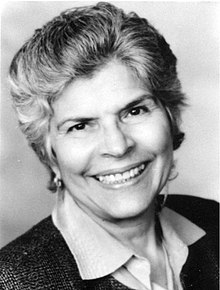Helen Rodríguez Trías
Appearance

Helen Rodríguez Trías (July 7, 1929 – December 27, 2001) was an American pediatrician, educator and women's rights activist. She was the first Latina president of the American Public Health Association (APHA), a founding member of the Women's Caucus of the APHA, and a recipient of the Presidential Citizens Medal. She is credited with helping to expand the range of public health services for women and children in minority and low-income populations around the world.
Quotes
[edit]- A watershed in my life was getting divorced in Puerto Rico—that was my second marriage—and leaving Puerto Rico to become part of the women’s movement. In my formation as a professional, there was always a kind of pressure to deny or not use a lot of your personal experience. The science of medicine, to some degree, negates the human, feeling, experiential part of it. But I was now discovering a whole other world out there through my personal experience of a deceptive marriage. That triggered quite a bit of growth in me toward understanding what happens internally to people, what happens in their lives and what they can do or not do…So I went back to New York and I got very involved in reproductive rights. I began to join in the women’s movement. At Barnard College there was a conference called the First International Conference on Abortion Rights that was attended by a few thousand women…We organized one of the first consciousness-raising groups of Latino women…A number of incredible things emerged from women talking about their experiences…We shared and we became very bonded. That was the beginning of my identification with women’s issues and reproductive health.
"The Face of Women's Health: Helen Rodriguez-Trias" by Joyce Wilcox (2002)
[edit]- My mother was a schoolteacher who fought for reforms such as the right to teach in Spanish, the vernacular,” she explained. “English was imposed upon the Puerto Rican school system when the US military invaded in 1898.
- In Puerto Rico, racism was subtle. There wasn't the kind of separatist racism like in the US. I wasn't used to this.
- I saw that anybody who could afford an abortion could get a perfectly fine one. It would be written up as an appendectomy. Women from the US used to go to Havana to get abortions.
- What brought me to the women's movement was the women's health movement. The cultural elements of feminism didn't resonate with me, but abortion resonated with me. I became part of the women's movement in October 1970 at an international meeting on abortion rights attended by several thousand women and held at Barnard College in New York City.
- Women brought a feminist perspective to health issues affecting women. They examined power relationships among individuals and between individuals and systems. The very early drafts of Our Bodies, Ourselves, by the Boston Women's Health Collective, which was seminal in all this, said we need to know our bodies, we need to know what makes us healthy and what threatens our health, and we need to negotiate or confront the health care system to get the best possible health from it.
- The only way to effect change was for more women to go into the professions and instill a different perspective—a more human touch and a more respectful relationship with patients.
- The women's movement was very diverse, but the more public positions articulated by the movement didn't include the experiences or concerns of women of color or of poor women.
- We got a lot of flack from White women who had private doctors and wanted to be sterilized,” she said. “They had been denied their request for sterilization because of their status (unmarried), or the number of their children (usually the doctor thought they had too few). They therefore opposed a waiting period or any other regulation that they interpreted as limiting access . . . While young white middle class women were denied their requests for sterilization, low income women of certain ethnicity were misled or coerced into them
- APHA has always provided a home for people in public health with a broad view of what public health is. Public health is really about people's life conditions and how these conditions do or do not promote health. APHA is committed to equity and ending all barriers, and has always been committed to civil, human and health rights. It's a wonderful place for women to be.
- We still have a system that excludes, underserves, and even misserves all too many people. The latest census tells us that there are over 44 million Americans without health insurance. That is inexcusable. The failed social policies of the past few decades have widened the gaps between rich and poor, well and poorly educated, medically indigent and consumers of elective high-tech surgery, owners of multi-mansions and the homeless. We need health, but above all we need to create a grounding for healthy public policy that redresses and salvages the growing inequities. We cannot achieve a healthier us without achieving a healthier, more equitable health care system, and ultimately, a more equitable society.

